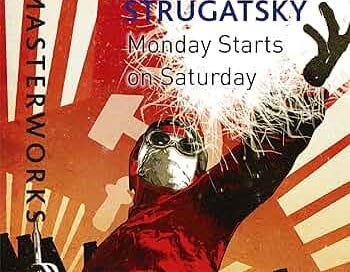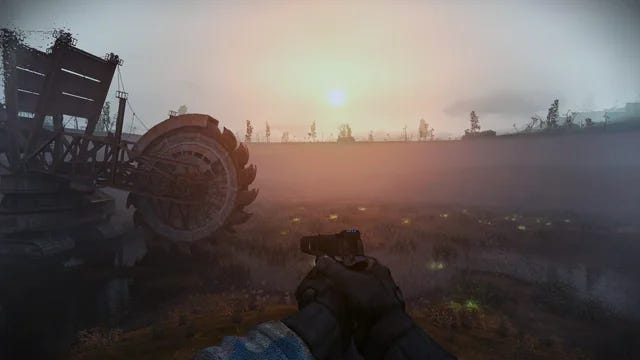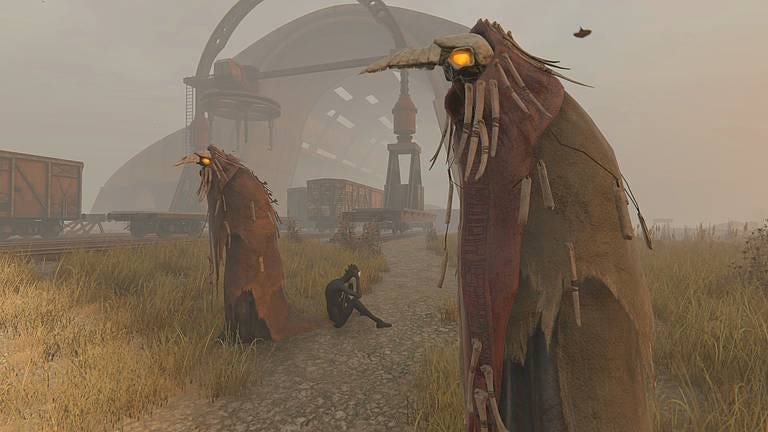Soviet Fiction : Monday Starts on Saturday
A discussion of Soviet Fiction and a work of Arkady and Boris Strugatsky
Introduction to Soviet Fiction
I love soviet fiction and consider it to be it’s own genre separate from Fantasy, Science Fiction, Urban Fantasy, or Modern Fiction. Soviet Fiction is something unique in the grand scheme of literature. While the Strugatsky brothers are primarily known for their book “Roadside Picnic,” the Strugatskys were extremely prolific authors with over 24 published books, many short stories, plays, screenplays, and other works. Soviet Fiction is a unique blending of the mundane, melancholic and supernal into a semi-structured whole.
Soviet fiction is melancholic and focused on the individual within in a broader and often incomprehensible environment. It is about the managerial state as much as it is about bizarre aliens, supernatural monsters, or apocalyptic technologies. It’s a story where the protagonist works at the Government Department of Waste-Reclimation running spreadsheets as the hours of his life slip away one by one. One evening, his boss tells him that he should go home early because:
“There’s an oroboros in the subway tunnels again and it’s caused a blockage on line 3 and half the trains are backed up. So why don’t you leave early so you can get home before midnight?”
In an ordinary western book, that would be a plot point. A shift in tone; a spark of the unknown. In soviet fiction, it’s an irritation because now our protagonist has to take a circuitous route to get home. His wife is mad because he’s late getting back, and the next morning when he gets to work life continues as before. Just another irritation to throw on the pile: right next to the efficiency report that’s due next week and which no one will actually read.
Soviet fiction is about stagnancy in the human condition: little victories and losses in life, and the little mysteries we get excited to solve in the face of a bewildering managerial state. All of those against the backdrop of an indifferent world (and an indifferent government bureaucracy). It may be a fantastical world of arcane beauty… but that doesn’t make spreadsheets any more engaging.
Soviet fiction is a genre that speaks to the adult and the child in the same voice. The voice of an author who has already lived through events and grown tired. It is a genre bound to its medium, unlike most others. A written Strugatsky book must be radically reshaped were it to become a film: new characters, new plot, new world building, are required to maintain the same vibe (as seen in the 1979 adaptation of Roadside Picnic by Andrey Tarkovsky or the 2007 videogame adaptation).
The only thing that’s “the same” between the book, the film, and the game are the vibes. Perfectly represented. That’s why there is something ineffable missing from the film adaptation of the videogame by Evan Muir (which is an adaptation of another film, which is an adaptation of the original book). To capture the vibe of soviet fiction, the plot/world-building/writing must be reshaped when the medium changes. The film STALKER 2024 is a decent adaptation of the plot and world-building, and writing of the videogame STALKER… but it doesn’t capture the spirit of the material the way STALKER 1979 does.
With all of that in mind, Soviet Fiction is a unique genre… and Monday Starts on Saturday is an excellent early example of it.
Monday Starts on Saturday
Monday Starts on Saturday was published by the Strugatsky brothers in 1977 and republished 50 years later in 2017. The book takes place in the fictional (and perfectly translated) Soviet "National Institute for the Technology of Witchcraft and Thaumaturgy (NITWITT).” The story is written as a series of 3 vignettes that describe High Academia from different perspectives.
The main character is Aleksandr Ivanovich Privalov, a computer programmer from Leningrad. In 1977, a computer programmer was a rare high-specialist commodity. He is recruited to work at NITWITT as the institute had recently acquired a large vacuum-tube computer with which to perform complex mathematical operations… They lack, however, a skilled programmer who can operate it; a frustration for the thaumaturgic researchers attempting to develop a formula for universal human happiness.
The stories are day-in-the-life style tellings that are equal parts petty feuds between faculty over valuable research equipment and fantastical and arcane elements of magical research. The Soviet Union treats the institute as something of a backwater; often late in sending crucial materials and, for the most part, leaving the institute to its own devices. Simultaneously, the faculty of the NITWITT institute has bizarre turf wars and popularity contests over research topics and rare artifacts that sometimes extend back to before the Soviet Union was even founded.
The stories combine the scientific method of analysis with the mysticism of fairy tales and the superstitious dream-logic of mythic stories. “Why is there a cat that can speak and tell any fairy tale that’s ever existed… but only the first half, forgetting the second half consistently?” No idea. But it’s there, and we can measure it and determine exactly how long its memory is. And write a report on it. And publish a paper… and then cite that paper in future publications.
I’m not going to go into details regarding the plot because the material is about the characters and philosophy. Like much Soviet Fiction, it’s the small character interactions that produce stories. Less a dedicated single thread and more a general unravelling of mysteries and personal relations over time.
If one were to liken it to a modern creation, the SCP Foundation is likely inspired by the NITWITT institute as described in the book. Turns out the Strugatskys originated the genres of both Soviet Fiction and the type of SCP government-creepypasta now common online. Honestly, my hat comes off to anyone to whom the origin of a single genre can be traced, much less two.
The book takes on the guise of three short stories, each dedicated to a different aspect of High Academia: A journey that those familiar with academia will likely have experienced.
The first story is an introduction. An individual with a highly specialized background finds an academic institution that has work for him. He’s something a novice in the actual focus of the institution, but he has the needed skill set. He looks at the world with a desire to learn and takes on an enthusiasm for ideas that had previously been only on the periphery of notice.
The second story is about learning to work within the institution. Learning about how the amazing can be mundane and about how the interpersonal drama’s between faculty are just as important as cutting-edge research. If your lab doesn’t get funding or equipment, you can’t do anything, so bizarre turf wars and popularity contests break out between faculty constantly. Even against a backdrop of truly awe-inspiring arcane research and enchantment, the real question is, “Why aren’t there Herring-heads supplied to our rectory? Did Boris mess with the delivery system again? Someone needs to reprimand him!”
The third story is, in many ways, about rediscovering the beauty in research with understanding and experience. It’s a sort of spiritual synthesis of academia between the silly faculty arguments and actual interest in learning about how the world works. It’s a mundane way to treat the supernal and a supernal way to treat the mundane. A conquest through understanding in microcosm, examining closely fundamental questions posed early in the book but ignored in favor of flashy arcane tricks. The end of the book culminates in the uncovering of a true mystery surrounding another researcher, presenting a cerebral discussion about fate and predestination.
Of course, all of the work by Strugatsky can be seen as a critique of the Soviet Union, which it is… but in the modern era, it can more closely be seen as a critique of the Managerial State. Those living in the West, itself having taken on many of the worst bureaucratic and managerial idiosyncrasies of the soviets, can appreciate Strugatskys’ books for that reason. I suspect it’s why books like Roadside Picnic (and the resultant fictions originating from it) are so popular.
On Fictional Academia
An important distinction is that the book was written about High Academia, that is, the world of academia which existed in the 60s, 70s, and 80s. It’s the version of Academia that I grew up hearing about in the late 90s. That is, it’s an acknowledgement of an academia that is better than modern academia. Modern academia has become a degree mill, pumping out over-valued pieces of paper and intersectional policy statements. The book is about Academia as it once was.
It is an honest look at High Academia from one who has clearly occupied that parapet before. This is what Academia once looked like. Things weren’t great then, either, but they had different types of policy and problems from what we have now. The midlevel bureaucracy was a lot smaller back then, and they definitely didn’t have intersectional feminism either. I like to think of this book as a time capsule of what High Academia and Research were once like. The modern form has substantially deviated over the last few decades into something unrecognizable.
For a look at how things are currently going in Academia, I recommend these articles by
, , and myself:How the Sciences Became Bullshit: Academic and Replication Crises
"The Modern Sciences are a Shit Show"
The Crumbling DEIvory Towers by John Carter
The Great Feminization of the American University by Christopher F. Rufo











I have 2 copies each of Roadside Picnic and Metro 2033 because I love to introduce people to them but I'm not risking them losing my only copy again.
Have you read the Strugatskys' "The Second Invasion from Mars"? Feels very pertinent today.
Just reading that now. Interesting book. Why is it that Russian authors always read like they were drunk while writing? This is the earliest instance I've found of a genre I call bureaucratic occult, more recent examples are the atrocity archives by Stross and the SCP foundation stories.
My favorite Soviet sf writer is Stanislaw Lem, his master's voice is the best first contact book I've read, and a great treatment of scientists trying to get to the bottom off a mystery.